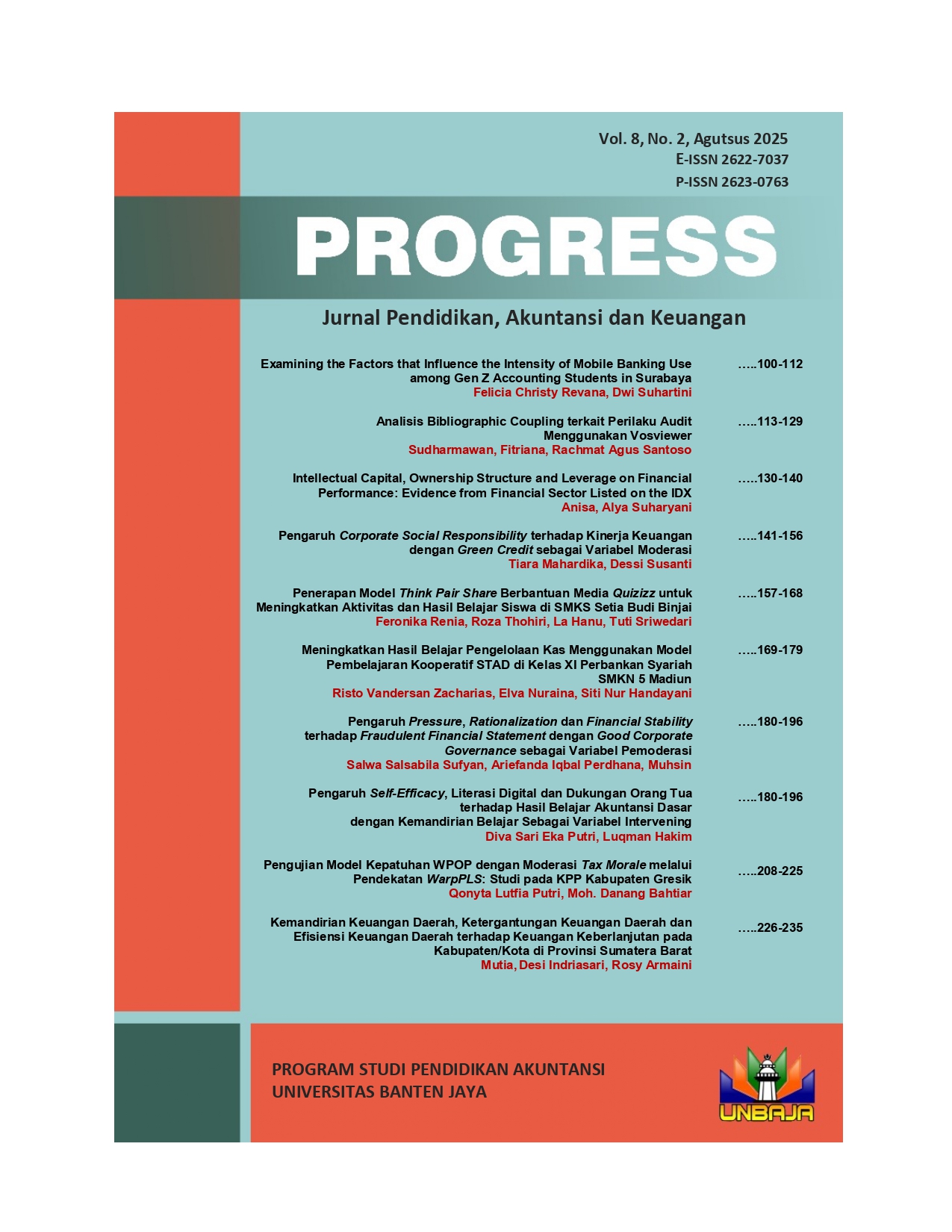Examining the Factors that Influence the Intensity of Mobile Banking Use among Gen Z Accounting Students in Surabaya
DOI:
https://doi.org/10.47080/6c826129Keywords:
Budgeting Behavior, Financial Literacy, lifestyle , Mobile Banking, Family-Peer InfluenceAbstract
This study aims to investigates how financial literacy, budgeting behavior, lifestyle, and peer influence affect the intensity of mobile banking usage among undergraduate accounting students at a private university in Surabaya. With the surge in mobile banking adoption among Generation Z, students face growing exposure to digital financial services without necessarily possessing strong financial management skills. Data was collected through a structured questionnaire from final-year students at five top-ranked private universities and analyzed using the PLS-SEM method through SmartPLS. The results showed that all four factors significantly and positively influence mobile banking usage, with lifestyle emerging as the most dominant predictor. This suggests that digital consumption patterns and social pressure strongly influence financial behavior. Budgeting behavior as a tool to control finances adjusted to lifestyle. These findings support the Theory of Planned Behavior (TPB) as a strong framework to explain college students' digital financial behavior. This research focuses on the need for financial education programs that integrate financial literacy and budgeting strategies adapted to modern digital lifestyles.
References
Cappelli, T., Banks, A. P., & Gardner, B. (2024). Understanding money-management behaviour and its potential determinants among undergraduate students: A scoping review. PLoS ONE, 19(8 August). https://doi.org/10.1371/journal.pone.0307137
Clarence, J., & Pertiwi, D. (2023). International Journal of Financial and Investment Studies (IJFIS) Financial Management Behavior Among Students: The Influence Of Digital Financial Literacy. https://doi.org/10.9744/ijfis.2.1.9-16
Fuadi, M. N., & Trisnaningsih, S. (2022). Pengaruh Literasi Keuangan Dan Lingkungan Sosial Terhadap Perencanaan Keuangan Pribadi. Jurnal Proaksi, 9(2), 97–111. https://doi.org/10.32534/jpk.v9i2.2332
Harper, C., Curs, B. R., Beasley, J., Mao, X., & Green, J. R. (2023). A Brief Budgeting Intervention’s Association With Financial Self-Efficacy in a College Student Success Course. Journal of Financial Counseling and Planning, 34(3), 393–403. https://doi.org/10.1891/JFCP-2022-0060
Kamil, & Islamiah. (2020). SpendingBehavior as an Impact of Lifestyle and Financial Literation in the Intensity of use of Mobile Payment Services. TEST: Engineering and Management
Nafis, R. Y., & Kasturi, T. (2023). Hubungan Social Comparison dan Kebersyukuran dengan Subjective Well-Being pada Remaja Pengguna Instagram. Jurnal Ilmiah Psikologi Candrajiwa, 8(2), 92. https://doi.org/10.20961/jip.v8i2.73852
Phung, T. M. T. (2023). Parental roles, financial literacy and budgeting behaviour: a survey during the COVID-19 pandemic. Journal of Applied Research in Higher Education, 15(3), 796–812. https://doi.org/10.1108/JARHE-03-2022-0086
Pratama, R. Y., & Abidin, F. I. N. (2022). The Effect of Financial Literacy, Ease of Use and Brand Image of E-wallet on Consumptive Attitudes of Accounting Students. Indonesian Journal of Innovation Studies, 20. https://doi.org/10.21070/ijins.v20i.726
Ramayanti, R. (2024). Understanding User Perceptions of QRIS in Indonesia. International Journal of Finance & Banking Studies (2147-4486), 13(4), 90–99. https://doi.org/10.20525/ijfbs.v13i4.3887
Sugiyono. (2023). Metode Penelitian Kuantitatif, Kualitatif.
Trianingsih, K., & Mahyuni, L. P. (2023). Pengaruh Gaya Hidup, Literasi Keuangan, Intensitas Penggunaan Mobile Payment Terhadap Spending Habits. https://binapatria.id/index.php/MBI Vol.17 No.9 April 2023
Widyakto, A., Murtini, D., Hanifah, R. U., & Santoso, A. (2022). Pengaruh Pendidikan Keuangan Di Keluarga, Pegetahuan Keuangan Dan Gaya Hidup Terhadap Perilaku Keuangan. Owner, 7(1), 410–422. https://doi.org/10.33395/owner.v7i1.1256
Yang, M., Al Mamun, A., Mohiuddin, M., Nawi, N. C., & Zainool, N. R. (2021). Cashless transactions: A study on intention and adoption of e-wallets. Sustainability (Switzerland), 13(2), 1–18. https://doi.org/10.3390/su13020831
Yanto, H., Ismail, N., Kiswanto, K., Rahim, N. M., & Baroroh, N. (2021). The roles of peers and social media in building financial literacy among the millennial generation: A case of indonesian economics and business students. Cogent Social Sciences, 7(1). https://doi.org/10.1080/23311886.2021.1947579
Yudha, I. M. R. P. A., & Yulianthini, N. Y. (2022). Pengaruh Lifestyle Dan Kualitas Produk Terhadap Keputusan Pembelian Iphone Di Kota Singaraja. Bisma: Jurnal Manajemen, 8(2).
Yudi Fitriyadi, M., Restu Rahman, M., Rifqi Azmi Asshidiqi, M., Arifin Ilham, M., Ika Aibina, O., Hesda, N., Al Fayyedh, F., & Dunia It Terhadap Perilaku Remaja Generasi, P. Z. (2023). Pengaruh Dunia It Terhadap Perilaku Remaja Generasi Z. Jurnal Religion: Jurnal Agama, Sosial, Dan Budaya, 1(2). https://maryamsejahtera.com/index.php/Religion/index






 Indexing Databases:
Indexing Databases:




